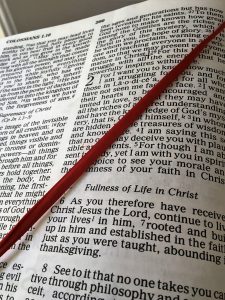 Ruth 3:10-18
Ruth 3:10-18
In our previous article, we saw that Boaz’ kindness toward Ruth involved acceptance of her. His kindness did more, and he gave her assurance. Boaz told her not to be afraid. He wanted her to know that her bold request had not turned him off or turned him against her. He didn’t push her away as some Moabite “gold-digger” or as a trashy woman. This would do much to calm her heart. On one level, we all need to think about how others might be feeling, the nature of their concerns and fears, when they request our help. People can feel vulnerable and fearful of being taken advantage of in their weakness. Jesus assures people of his kindness when he invites us to draw near to him. Come to me, all you who are weary and burdened, and I will give you rest. (Matthew 11:28). Right now, you can call on the Lord to rescue you from sin, guilt and condemnation. “Come” is his great word of acceptance!
Boaz promised to marry her and to be her kinsman- redeemer. “I will do all you ask.” Can you see the joy on her face as he said these words? This was a big step for Boaz to take, and though he did not know it, it was a significant action in the true story of God’s glory in Christ. How often God has had his story work out through choices of people. Your life is important. If you ask Jesus to forgive your sins of refusing God’s love, rejecting who God is, and rebelling against God’s way, he will do all you ask—and more! You will become part of his people and his story that leads to glory in eternity.
Boaz commended her. She was a woman of noble character (cf. Proverbs 31:10-31) or more literally, “a woman of strength”. She had strong character traits. He said that she was a good match for him, since he was known as a “man of standing” (cf. 2:1). His generosity in being willing to marry a poor widow was matched by Ruth’s generosity to marry Boaz out of kindness. When two people marry, they should marry with a vision of what they want to accomplish through their partnership. “If we join together as husband and wife, by God’s grace we can glorify the Lord together in these ways.” You should marry to make a better contribution in the story of God’s glory than you could make single. If that wasn’t your vision when you married, it ought to be starting right now. Get together with your spouse and think through how God can work through your marriage partnership. What combination of gifts and skills do you have that can be used together to bring others to the Lord?
His kindness led Boaz to strengthen her with affirmation. He committed himself to her, as much as he lawfully could at that moment. But Boaz had to present a potential problem. There was another kinsman who was a closer relation, and he had the first right to redeem. Boaz could not act out of turn (cf. Leviticus 25:48-49; Numbers 27:8-11). This may have been why Boaz had not suggested anything previously. He could not interfere with another man’s rights. It might also be the reason for Naomi’s bold plan. She had simply waited long enough for the other guy to act as a redeemer, and so she forced the issue. Yet Boaz must do everything in a legal manner. He is willing to accept the Lord’s will (“good”), if the other man chooses to redeem her.
But Boaz wanted Ruth to know his deep concern for her, so he made a promise with an oath to marry and redeem her, if the other man would not. Since we live in the new covenant, Jesus directs us simply to tell the truth (Matthew 5:37) without making oaths. We all ought to be people of integrity. But in an age of falsehood, we need to grow in honesty and truthfulness. This can be part of our worship of our God.
Grace and peace, David

 Ruth 3:5-9
Ruth 3:5-9 Ruth 3:1-2
Ruth 3:1-2 Ruth 3:1-2
Ruth 3:1-2